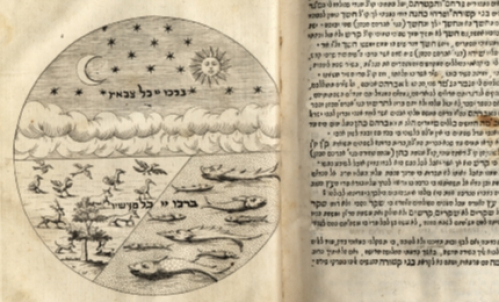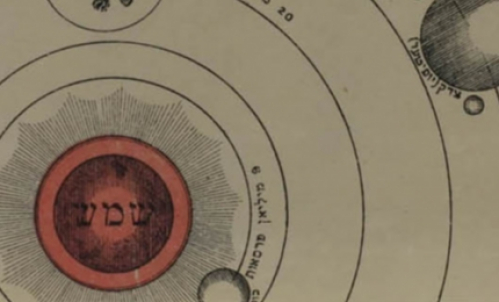Jewface: "Yiddish" Dialect Songs of Tin Pan Alley
November 2015 – June 30, 2016
With his fake beard, putty nose, and thick Yiddish accent, the “stage Jew” was once a common character in vaudeville, part of a genre that mocked immigrants and minorities in terribly offensive ways. Essentially a variant of blackface minstrelsy, the music that accompanied these “Jewface” performances was not only performed on stage, but was also published as colorfully illustrated sheet music so fans could play them at home.
Outrageous and offensive by today’s standards, these “Yiddish” dialect songs sung by these figures exploited a variety of unpleasant stereotypes about Jews. The sheet music produced for the genre engaged some of the same unpleasant stereotypes.
While the genre was initially created by gentile performers to make fun of Jewish immigrants, it was eventually taken over by Jews, who apparently felt that they could do a better job mocking themselves. Irving Berlin, Fannie Brice, and Sophie Tucker were just a few who wrote and performed these Yiddish-inflected songs.
Based in part on the sheet music collection of The New York Times’ Sunday Magazine Critic-at-large Jody Rosen, YIVO presents Jewface: “Yiddish” Dialect Songs of Tin Pan Alley. A lost historical phenomenon, “Jewface” sheet music provides a look into the ways in which early 20th century entertainment mocked Jews, engaged Jews, and developed Yiddish-accented English for comic effect.
The Music of “Jewface”
At the Yiddish Wedding Jubilee
Words and music by Joe McCarthy, Joe Glogau, and Al. Piantadosi
1912
Cohen Owes Me Ninety Seven Dollars
Words and music by Irving Berlin
1915
The Darktown Strutters’ Ball
Words and music by Shelton Brooks
1917
I’m a Yiddish Cowboy (Tough Guy Levi)
Words by Leslie Mohr, music by Al. Piantadosi
1907
If I Knock the “L” Out of Kelly, It Would Still Be Kelly to Me
Words by Sam M. Lewis and Joe Young, music by Bert Grant
1916
Sadie Salome Go Home
Words and music by Edgar Leslie and Irving Berlin
1909
Under the Matzos Tree
Words and music by Fred Fischer
1907
Vamping Rose: Yiddisher Fox-Trot
Words by Bert Hanlon and Ben Ryan, music by Violinsky and Ira Schuster
When Mose with his Nose Leads the Band
Words by Bert Fitzgibbon and Jack Drislane, music by Theodore Morse
1906
Bibliography
The Idelsohn Society for Musical Preservation produced a CD entitled “Jewface” in 2006 that includes some of recordings of the sheet music in this exhibit, as well as a marvelous overview of the phenomenon by Sunday Times Magazine’s Critic-at-large and collector, Jody Rosen. You can find it here: idelsohnsociety.com/music/jewface
For further reading on the complicated history of Jewface and popular entertainment, as well as related issues in popular culture, please consult the following:
Brundage, W. Fitzhugh. Beyond Blackface : African Americans and the Creation of American Popular Culture, 1890-1930, The University of North Carolina Press, 2011.
Cohen, Mark. “My Fair Sadie: Allan Sherman and a Paradox of American Jewish Culture” in American Jewish History, Volume 93, Number 1, March 2007, The Johns Hopkins University Press, pp. 51-71.
Erdman, Harley. Staging the Jew (Rutgers University Press, 1997)
Fermaglich, Kirsten. “Mel Brooks' The Producers: Tracing American Jewish Culture Through Comedy, 1967-2007” in American Studies, Volume 48, Number 4, Winter 2007, Mid-American Studies Association, pp. 59-87.
Katz, Naomi and Eli. “Tradition and Adaptation in American Jewish Humor” in The Journal of American Folklore, Vol. 84, No. 332 (Apr. - Jun., 1971), pp. 215-220.
Kun, Josh. “The Yiddish Are Coming” in American Jewish History, Volume 87, Number 4, December 1999, The Johns Hopkins University Press, pp. 343-374.
Mintz, Lawrence E. “Humor and Ethnic Stereotypes in Vaudeville and Burlesque,” MELUS, Vol. 21, No. 4, Ethnic Humor (Winter, 1996), pp. 19-28.
Musser, Charles. “Why Did Negroes Love Al Jolson and The Jazz Singer ?: Melodrama, Blackface and Cosmopolitan Theatrical Culture” in Film History: An International Journal, January 2011, Vol. 23, Issue 2, p. 196-222.
Soper, Kerry. “From Swarthy Ape to Sympathetic Everyman and Subversive Trickster : The Development of Irish Caricature in American Comic Strips between 1890 and 1920” in Journal of American Studies, 39 (2005), 2, 257–296 f 2005 Cambridge University Press
Taylor, Yuval and Jake Austen. Darkest America: Black Minstrelsy from Slavery to Hip-Hop, W.W. Norton & Co., 2012.
Weber, Donald. “Taking Jewish American Popular Culture Seriously: The Yinglish Worlds of Gertrude Berg, Milton Berle, and Mickey Katz” in Jewish Social Studies, New Series, Vol. 5, No. 1/2, (Autumn, 1998 - Winter, 1999), pp. 124-153.






